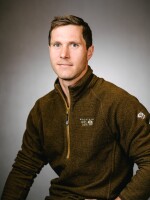Utah's Republican dominated Legislature can be a lonely place for a Democrat. That can be especially true for the only openly gay legislator. For six years, that person was Jim Dabakis representing Senate District 2.
When Dabakis decided to leave the Legislature, Salt Lake City Council member Derek Kitchen ran for his Senate seat and won. Coincidentally, Kitchen is also gay. Both men visited KUER to talk about what it means to be the only LGBTQ voice in the statehouse.
Dabakis: There's a hundred and four legislators. I was the only LGBT member, and it means a lot! It means a lot when you're sitting on the Judiciary Committee and every single future judge — from the Supreme Court to every juvenile court everywhere in the state — has to go spend an hour with you in a coffee shop. And you ask them, 'What is your experience with gay people? What do you think about trans people? Do you understand these issues?' And they have to answer.

Kitchen: Yeah I agree. I think, you know, with a body of 104 people and there's only one out queer person, it's incredibly important to have somebody out there representing this community, because whether you're from Salina and Kanab or Cache Valley or Salt Lake City for that matter, there's gay people everywhere in this state, and visibility is incredibly important. Working on housing or air quality and seeing that you can be gay, you can be lesbian, you can be trans and you can still participate in policy making and the direction of this government, is really important for people.
Dabakis: I always saw my Senate seat not just as the second district. I recognized and took very seriously the responsibility to represent LGBTQ people all across the state, because a lot of their representatives don't represent them. Their voice is unheard. So every time I traveled out of Salt Lake County, I made it a point to go see the students at universities and colleges. There was a story at Boy's State. This is about 150 rabid high school boys between their junior and senior year, and it's very rural and it's very conservative and it is full of young Republicans. One of the boys came over and said, 'Could I talk to you for a minute?’ So we shook hands and his lip started to quiver and he looked at me and he said, 'I've never shaken hands with a gay person except me.' This is an important job. I went out of my way, Derek, to look for the best interns and the best young people to work with me. The supply chain isn't that big of young queer people that are heavily involved in the political process, so I hope you would consider taking the best woman for the job, but giving some extra weight, because there's a lot of legislators out there that won't pick somebody.
Kitchen: I'm glad you brought that up. I think that, for me, mentorship is really important. You know, I've had a number of individuals that have guided me and given me direction and advice and support and a platform to talk about things that I care about for a long time. That's something that I totally intend to do in my role as a state Senator representing Senate District 2 — is to cultivate new leaders to give young people an opportunity to see how the government works from the inside.
Dabakis: I remember a young Derek Kitchen spending a day with me in the Senate and wandering around and trying to run you ragged, and then you got you kind of got a vision, and I can't remember — I don't think you're a city councilman yet were you?
Kitchen: No, not quite.
Dabakis: But then, as you expect, the next generation young Derek Kitchen would call me regularly, not particularly to ask advice, but to say, 'Are you healthy? Are you sure you’re going to run for the Senate? I know you're getting a little old here.' And that's what you want! You want the next generation to be a little pushy and a little bit ambitious, kind of moving things along. That's the way it ought to be.
Kitchen: I remember that very clearly. I was incredibly intimidated by by you and the role that you were playing in the Senate. But it was eye opening for me.
Dabakis: You know you're having an effect every time you go, every time you've done your homework, every time you're a good legislator, every time you show you know about things other than LGBT. Every time you stand up and you're not afraid to bring up the example of LGBTQ issues, you're having an effect on your peers and on all those involved in the legislative family and on elected officials everywhere. I can't imagine a better representative for carrying that mantle forward than you, and I'm looking forward to seeing how you're going to navigate all this.
Kitchen: Well, thank you. You know building these relationships with conservatives and moderates and independents and Democrats alike is going to be incredibly rewarding.
This conversation was produced by Erik Neumann.


